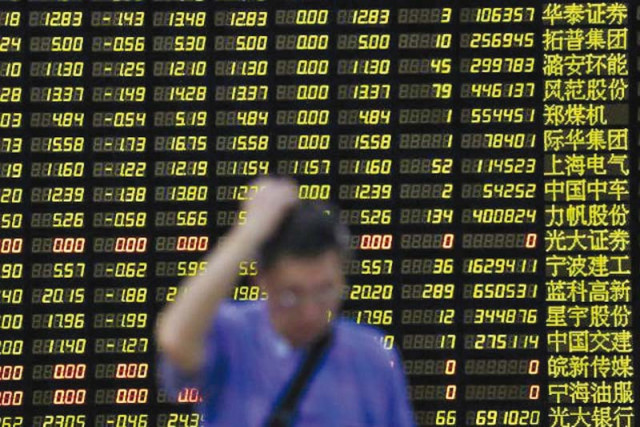China’s slowdown: Why another global crisis is not in the offing
Economies have far stronger capacity to weather such shocks

China has barred foreign investment in mainland stocks and roughly 80% trading is by Chinese companies and individuals. This is unlike the global financial crisis when investors from all over the world had bought into the US-subprime. PHOTO: REUTERS
The recent tumbling of global stock markets across the world due to devaluation of the Chinese yuan has raised fears of another global recession.
It has been estimated that around $5 trillion has been wiped off global equity markets since.
On Monday 24 - popularly termed as the ‘Black Monday’ - global stock market indexes witnessed an almost vertical fall, the Karachi Stock Exchange (KSE)-100 Index also headed south when it went down by 4.1% or 1,419.4 points.
Selling by foreign investors who hold about $7 billion in investment and panic selling by small local investors brought the market down.
Reason behind stock market crisis
Being the second largest economy, China’s weakening economic fundamentals sent ripples throughout the world, leading to a significant shake-up in investor confidence.
China has a large import base standing at $1.96 trillion and the prospects of slowing growth in China is viewed with much stress by commodity exporting countries. It has consequently also led to a decline in commodity prices.
Moreover, following China’s devaluation of the yuan, the world’s emerging economies are also letting their currencies slide in a quest to remain competitive. As a case in point, the South African rand and the Indonesian rupee have slid to historic lows against the dollar.
Following this doomsday scenario, Beijing reacted by injecting $101 billion through cutting interest rates and lowering the amount of reserves the banks must hold for the second time in two months.
Some analysts have likened this current phase to that of the Dow Jones crash in 1929 which led to the Great Depression while some consider the current phase to be similar to the Asian Financial Crisis of the late 90s. I present the viewpoint that the effect on the rest of the world would be controlled — at least in the short run and present some reasons to justify my stance.
How is it different
After the onset of the global financial crisis of 2008, there has been a huge volume of research which has analysed the role of ‘systemically important financial institutions’ in propagating shocks to the economy.

One of the key facets of these institutions was their ‘interconnectedness’ or within country and cross-border financial linkages through cross border financial flows, payment systems etc.
In the globalised world of today, interconnectedness has gained importance in transmitting shocks to other financial institutions and even economies.
However, in the case of China, the country has barred foreign investment in mainland stocks and roughly 80% of the trading in the stock exchange is by Chinese companies and individuals. This is unlike the global financial crisis when investors from all over the world had bought into the US-subprime.
Secondly, after the Asian Financial crisis and the global financial crisis of 2008, Asian economies have a far stronger capacity to weather such shocks. There has also been a focus on more effective regulation and financial systems are better managed and robust.
Moreover, fixed exchange rate regimes which were followed by many nations during the Asian financial crisis during the 1990s are absent now and are replaced by flexible exchange rates. Asian nations are also aided by a healthy balance of foreign exchange reserves which was largely absent during the 90s.
Lastly, analysts have also claimed that almost every recession since the Second World War has been preceded by a sharp rise in oil prices, which in the past year have more than halved.
Although I have taken the viewpoint of an optimist, this does not exclude the possibility of a crisis like situation developing in the future. The stock market nosedive could affect the Chinese economy and hence, impact the rest of the world through its sheer size.
Commodity exporting countries would be worst affected as China imports iron ore, coal and copper and falling commodity prices could result in recessionary trends in those economies. China would have to take serious steps in order to avert any crisis-like situation in the future.
The writer is an economist and
ex-central banker
Published in The Express Tribune, August 31st, 2015.
Like Business on Facebook, follow @TribuneBiz on Twitter to stay informed and join in the conversation.



















COMMENTS
Comments are moderated and generally will be posted if they are on-topic and not abusive.
For more information, please see our Comments FAQ